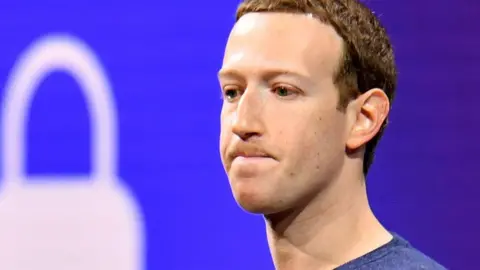Fake news a democratic crisis for UK, MPs warn
 PA
PAThe UK faces a "democratic crisis" with voters being targeted with "pernicious views" and data being manipulated, a parliamentary committee is set to warn.
The Digital, Culture, Media and Sport (DCMS) Committee has been investigating disinformation and fake news following the Cambridge Analytica data scandal.
In its first report, MPs will suggest social media companies should face tougher regulation or a new tax.
It also proposes measures to combat election interference.
The MPs' report comes after months of investigating the impact of technology giants and how people are affected by the rise in fake news on social media.
It also probed whether Russia had a role in influencing voters in the EU referendum.
The committee's report was due to be officially published on Sunday.
But a copy was leaked on Friday by Dominic Cummings, the director of the official Brexit campaign group Vote Leave, who published it on his own blog.
Mr Cummings was asked and officially summoned to take part in the inquiry - to respond to allegations made against the Vote Leave campaign - but he refused. Mr Cummings called the report "fake news".
According to the leaked report, MPs say "our democracy is at risk and now is the time to act".
The committee highlights the "relentless targeting of hyper-partisan views, which play to the fears and prejudices of people, in order to influence their voting plans".
The report is expected to be very critical of Facebook, which has been under increased scrutiny following the Cambridge Analytica data scandal.
"Facebook has hampered our efforts to get information about their company throughout this inquiry. It is as if it thinks that the problem will go away if it does not share information about the problem, and reacts only when it is pressed," it will say.
"It provided witnesses who have been unwilling or unable to give full answers to the committee's questions."
It will repeat its call for Facebook chief Mark Zuckerberg to give evidence.
 AFP
AFPThe committee's report will also say it had received "disturbing evidence" - some of which it had not published - of hacking, disinformation and voter suppression in elections since 2010.
"We urge the government to ensure that the National Crime Agency thoroughly investigates these allegations."
What will the committee recommend?
Social media sites should be held responsible for 'harmful' content on their services
Companies such as Facebook and YouTube have repeatedly said they are just a "platform", rather than a "publisher". They have argued that they are not responsible for the content people post on their services.
The committee's report is expected to say social media companies "cannot hide behind" this claim.
A "new category of tech company" which is something in between a platform or publisher should be created, the committee will suggest. This should establish "clear legal liability for the tech companies to act against harmful and illegal content on their platforms".
The rules on political campaigns should be made fit for the digital age
The committee will say that electoral law needs to be "updated to reflect changes in campaigning techniques".
 Facebook
FacebookIt will suggest:
- creating a public register for political advertising so that anybody can see what messages are being distributed
- online political advertisements should have a digital imprint stating who was responsible, as is required with printed leaflets and advertisements
- social media sites should be held responsible for interference in elections by malicious actors
- electoral fraud fines should be increased from a maximum of £20,000 to a percentage of an organisations' annual turnover
Social network security should be audited
The report will suggest that an independent body such as the Competition and Markets Authority should audit the social networks.
It will say that security mechanisms and algorithms used by social networks should be available for audit by a government regulator, to ensure they are "operating responsibly".
The committee will also warn that fake accounts on sites such as Facebook and Twitter "not only damage the user experience, but potentially defraud advertisers" who could be paying to advertise to accounts not run by real people.
 Reuters
ReutersTech companies should be taxed to fund education and regulation
Tighter regulation of social media sites would mean more work for organisations such as the Electoral Commission and Information Commissioner's Office (ICO).
The committee will suggest a tax on tech companies. Some of the money should fund the extra responsibilities of the regulators.
The rest of the money should be spent on digital education in schools and a public awareness campaign, to help people identify disinformation and fake news.
"Digital literacy should be the fourth pillar of education, alongside reading, writing and maths," the report will say.

The report will also summarise the evidence collected during the committee's inquiry, which was launched in September last year.
Whistleblower Christopher Wylie and Cambridge Analytica chief executive Alexander Nix were among the 61 witnesses that gave evidence.
 AFP
AFPTom Baldwin, who has written a book on the relationship between politics and media, told BBC Radio 4's Today programme the report's recommendations did not go far enough.
"The social media ads that were seen used by Donald Trump and the Leave campaign are the most lethal political weapons ever invented," Mr Baldwin said.
Will Moy, the head of fact checking charity Full Fact, told the BBC that the same conversation about fake news is going on around the world - and the reaction of some governments had been "quite scary".
He said MPs should acknowledge that it is important to also "stand proudly on being an open society and valuing free speech".
Rules for political advertising have become out of date because they do not work for online, and the transparency of where adverts come from should be available immediately, he added.
Meanwhile, Jamie Bartlett, the head of think tank Demos, said the report is about the "long-term integrity of elections" so people "trust they are getting accurate information".
He said he fears the Brexit debate could distract the focus of the issue.
"So those who are pro-Brexit will dismiss a lot of it, those who are anti-Brexit will say 'this is why we should have another referendum, and then we miss what is essentially far more important: The long-term health of democracy."
The committee's final report is expected before the end of the year.
Facebook and Twitter have yet to respond to a request for comment.
